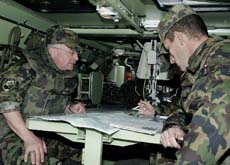Swiss support their army and neutrality

A survey on security shows a vast majority of people continue to consider Switzerland a very safe country, but they are increasingly concerned about global events.
A majority has come out in favour of remaining neutral in military conflicts and of contributing peacekeepers to the United Nations.
The survey, published on Thursday, was carried out in January and February this year by the Centre for Security Studies at the Zurich-based Federal Institute of Technology.
It found the number of people who are optimistic about the future of Switzerland rose from 65 to 70 per cent – the first increase in four years.
Karl Haltiner who led the study said the hike was a reflection of the economic upturn.
The Swiss are mainly concerned about a perceived rise in extremism and the high number of immigrants in the country.
However, there is increasing scepticism – for the third time in row – about the global political situation amid fears of terrorist attacks.
An overwhelming majority approved the government policy to base its relationship with the European Union on bilateral accords, while the UN has lost some of its high acceptance. Criticism of the government’s decision to contribute troops to UN peacekeeping operations has risen slightly.
Army, neutrality
Three out of five people interviewed also approved a proposal to boost the number of Swiss soldiers serving abroad to 500. There are currently 220 Swiss troops taking part in a Nato-led mission in Bosnia-Herzegovina, as well as about 100 military observers and experts serving in other countries.
The Swiss militia army enjoys one of the highest approval rates – 75 per cent – in years despite an ongoing debate over a reduction in troop numbers and a certain shift in strategy. Only police and the courts inspire more trust in the population, according to the survey.
An increasing number of those polled would prefer male conscripts be given the choice between serving in the country’s armed forces and doing some other form of community work.
But proponents of a professional army appear to have lost ground to those supporting the traditional militia system.
The report also says an overwhelming majority of interviewees came out in favour of the principle of armed neutrality. They believe Switzerland’s long-standing tradition contributes to security and stability in Europe.
The survey was published just a day after the government announced plans to make it mandatory for a small core of professional army members to serve at least in one mission abroad.
The proposals are part of a package of controversial reforms to be discussed by parliament at a later stage.
swissinfo with agencies
According to the federal constitution, the army’s task is to prevent war and contribute to the maintenance of peace. It supports civilian authorities when there are serious threats to internal security and during crises.
Since the end of the Cold War, the army also participates in humanitarian and peace missions.
During the Cold War, the Swiss army numbered 600,000 men who could be called up at short notice. In 1995 the army was reduced to 400,000 and today it is 220,000.
Today, able-bodied males between the ages of 20 and 36 must serve 260 days of military service. Military service is optional for women and Swiss living abroad.
Feeling secure: 88% (+1%)
Optimistic about Switzerland: 70% (+5%)
Optimistic about global situation: 55%
Approval of neutrality: 90%
Approval of role of the armed forces: 75%

In compliance with the JTI standards
More: SWI swissinfo.ch certified by the Journalism Trust Initiative









You can find an overview of ongoing debates with our journalists here . Please join us!
If you want to start a conversation about a topic raised in this article or want to report factual errors, email us at english@swissinfo.ch.